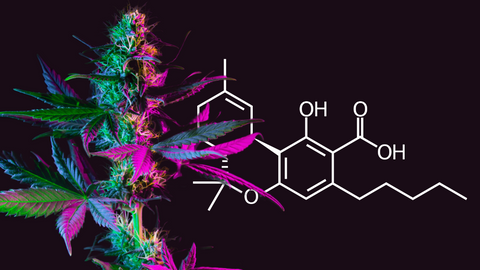THCa, the main cannabinoid found in cannabis, is making waves in the legal market with its versatile effects and positioning itself as the new era of cannabis consumption. But how does THCa actually work, and what happens when it's converted to THC? In this article, we'll explore the science behind THCa and its conversion to THC, as well as the legal status of high-THCa products.
The Science Behind THCa
THCa, or tetrahydrocannabinolic acid, is the raw, acidic form of THC that is found in living cannabis plants. THCa is not psychoactive on its own, and must be converted to THC through a process called decarboxylation. Decarboxylation occurs naturally over time as the cannabis plant dries and ages, but can also be expedited through methods such as heating or burning the plant material.
When THCa is decarboxylated, the molecule loses its carboxylic acid group, resulting in the formation of THC, or delta-9-tetrahydrocannabinol. THC is the psychoactive compound that produces the well-known "high" associated with cannabis use. This process can occur through smoking, vaping, or baking cannabis products.
It's worth noting that THC is not the only compound produced during decarboxylation. Other cannabinoids, such as CBD and CBN, are also created as THCa is converted to THC. These compounds can have their own unique effects and benefits, and their presence can modify the overall experience of consuming cannabis.
The Legality of THCa
In addition to its potential health benefits, THCa has gained popularity in the cannabis industry due to its legal status in many states and territories. The 2018 Farm Bill legalized hemp, which is defined as "the plant Cannabis sativa L. and any part of that plant, including the seeds thereof and all derivatives, extracts, cannabinoids, isomers, acids, salts, and salts of isomers, whether growing or not, with a delta-9 tetrahydrocannabinol concentration of not more than 0.3 percent on a dry weight basis1."
THCa is currently at the federal level treated the same as other cannabinoids that are not delta-9-THC. The underlying controlling law (referring to the 2018 Farm Bill) is still applicable and includes any and all byproducts of industrial hemp, like THCa, in the definition of industrial hemp. This means it takes THCa as a cannabinoid out of Schedule I.
The production of THCa Flower is a rigorous and systematic process. Initially, the hemp plant must pass a pre-harvest analytical test that verifies its concentrations of both delta-9-THC and THCa. The "total THC" content of the plant, calculated from this test, must not exceed 0.3% for the plant to be harvested. Following this, the harvested hemp is dried, cured, and trimmed under highly controlled conditions. The end product is a batch of cannabis flowers that align with the statutory definition of "hemp" under both federal law and the laws of the relevant state. Total THC calculations are only required by law for pre-harvest testing, any subsequent tests performed determine hemp solely by the delta-9-THC levels.
This means that THCa hemp products, which contain less than 0.3% delta-9-THC, are legal in many areas. However, it's important to note that laws surrounding cannabis can vary widely by state, and consumers should always research the regulations in their specific area before purchasing or consuming cannabis products.
Despite its legal status under federal law and the laws of many states, THCa is often misunderstood and controversial. The challenges predominantly stem from a lack of understanding about the product and its regulation, potentially leading to incorrect application of the law by government authorities. Additionally, specific testing methodologies used by law enforcement can chemically convert THCa in the sample to delta-9-THC. This creates a scenario where a product legally classified as hemp could be considered illegal marijuana under the law.
Conclusion
THCa is an important component of the cannabis plant, and its conversion to THC is a crucial part of the process of cannabis consumption. Understanding the science behind THCa and decarboxylation can help cannabis enthusiasts make informed choices about how they consume their products, and can lead to a safer, more enjoyable and effective experience. And with the changing legal landscape surrounding cannabis, THCa may continue to play a prominent role in the cannabis industry for years to come, but consumers should always check their local laws and use caution, treating THCa products as if they were marijuana to avoid any potential legal issues.
Legal Disclaimer
Please note that the content of this article is intended for informational purposes only. It does not constitute legal advice and should not be used as such. While we strive to provide accurate and up-to-date information, laws and regulations surrounding cannabinoids are subject to change and can vary by jurisdiction. We are not legal professionals, and we strongly recommend that you consult with a qualified attorney or other legal professional to understand the current legal landscape in your specific location before making any decisions based on the information provided in this article. Always ensure that you are in compliance with your local, state, and federal laws.




Comments (0)
There are no comments for this article. Be the first one to leave a message!